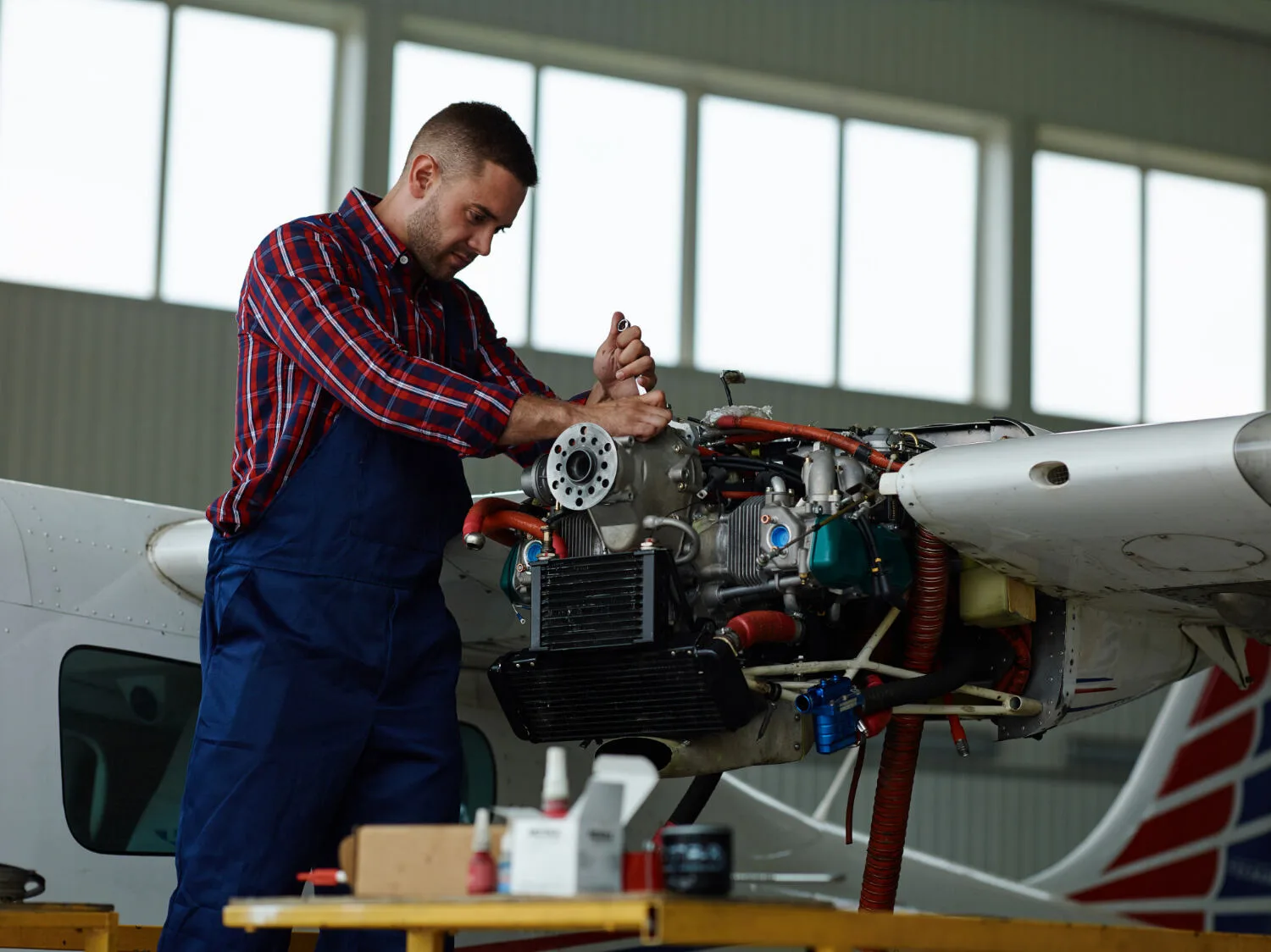I. Introduction
Overview of Aerospace Engineering
Aerospace Engineering is a multidisciplinary field that involves the design, development, and operation of aircraft, spacecraft, and related technologies. It encompasses various aspects, including aerodynamics, propulsion, structures, and systems integration, and is essential for the advancement of human space exploration and aviation.
Significance of Choosing the Right University
The choice of university can significantly impact your academic and professional trajectory. It’s not just about the academic excellence offered, but also about the environment that fosters innovation, research, and personal growth. The right university can provide you with the resources, opportunities, and support needed to thrive in the field of Aerospace Engineering.
II. Advantages of Studying Aerospace Engineering in the UK
Aerospace Engineering unfolds a world of possibilities, and the UK takes center stage in this vibrant industry. Delving into the realm of Aerospace Engineering education, the UK offers an array of advantages that make the experience truly enriching.
Growing Aerospace Industry in the UK
The aerospace sector in the UK is undergoing unprecedented growth, creating an exhilarating environment for those entering the field. With over 128,000 jobs in the aerospace industry and a remarkable 39% growth over the last five years, the UK stands as a thriving hub of innovation and opportunity.
Opportunities and Industry Advancements
Choosing to study Aerospace Engineering in the UK opens doors to a myriad of opportunities and industry advancements. The well-established aerospace sector, a significant contributor to the UK economy, provides students with a fertile ground for gaining practical experience and engaging in cutting-edge research and development initiatives.
Renowned institutions like Imperial College London, the University of Bristol, and the University of Leeds
lead the charge in propelling advancements in the field. These universities offer world-class programs, robust industry connections, and a dynamic academic environment, positioning students for success in their careers in Aerospace Engineering.
III. Program Overview and Duration
Embarking on a journey into Aerospace Engineering in the UK unveils a rich tapestry of programs designed to cater to different academic aspirations. These programs span undergraduate and postgraduate levels, offering Bachelor’s, Master’s, and Ph.D. degrees.
Breakdown of Bachelor’s, Master’s, and Ph.D. Programs
The Bachelor’s program in Aerospace Engineering typically spans three to four years, providing a foundational understanding of engineering principles, analytical skills, and specialized knowledge crucial for roles in the aerospace industry. The curriculum encompasses key areas such as aerodynamics, propulsion, structures, and systems integration, laying the groundwork for a fulfilling career.
Master’s degrees in Aerospace Engineering present two primary options: the Master of Science (MSc) and the Master of Engineering (MEng). The MSc focuses on advanced knowledge and skills for career progression, while the MEng delves deeper into the field, catering to those aspiring for research and development roles. The Master’s journey generally takes one to two years, offering a more specialized and in-depth exploration of aerospace concepts.
Ph.D. programs in Aerospace Engineering are research-intensive endeavors typically spanning three to four years. These programs provide a unique opportunity for students to contribute to cutting-edge research in the field, advancing the boundaries of Aerospace Engineering knowledge and positioning themselves as experts in their chosen areas of study.
Approximate Duration for Each Program
The duration of Aerospace Engineering programs varies based on the academic level and the specific university. Bachelor’s degrees typically take three to four years, Master’s degrees span one to two years, and Ph.D. programs generally require three to four years for completion. This variation allows students to tailor their academic journey based on their career aspirations and research interests.
Aerospace Engineering programs in the UK present a diverse and comprehensive curriculum, covering essential aspects of the field. With options at the undergraduate and postgraduate levels, students can choose a path that aligns with their career goals, be it through a foundational Bachelor’s degree, a specialized Master’s program, or a research-intensive Ph.D. endeavor.
IV. Top 10 Universities for Aerospace Engineering in the UK (Ranked 2024)
Embarking on a journey in Aerospace Engineering is a profound decision, and choosing the right university is paramount to shaping your academic and professional trajectory. The UK boasts a constellation of top-tier universities for Aerospace Engineering, each presenting distinctive programs, expansive research opportunities, and invaluable industry affiliations.
1. Imperial College London

Imperial College London is a world-renowned institution with a strong focus on science, engineering, medicine, and business. The Aerospace Engineering program at Imperial College London is designed to provide students with a comprehensive understanding of the principles and practices of aerospace engineering. The program covers a range of subjects, including aerodynamics, propulsion, structures, materials, and control systems. The university’s strong emphasis on research and innovation ensures that students are exposed to the latest developments in the field, and the program is designed to equip students with the skills needed to succeed in the aerospace industry. The university’s strong industry connections and engagement with its Industrial Advisory Board ensure that the program meets the needs of the industry, providing students with a comprehensive and relevant education to prepare them for successful careers in aerospace engineering. The Aerospace Engineering program at Imperial College London is highly regarded, and the university is consistently ranked among the top universities in the world for engineering.
– Overview:
Renowned for excellence in aerospace engineering education and research, Imperial College London stands as a beacon of innovation. Its programs cover a diverse array of facets within the field, and students benefit from a vibrant academic community and cutting-edge facilities. The university offers programs such as Aeronautics, Astronautics, and Aerospace Engineering.
The key statistics and information for the Aerospace Engineering program at Imperial College London are as follows:
- Ranking: Imperial College London is ranked 1st for Aeronautical and Manufacturing Engineering in The Times and Sunday Times Good University Guide 2023.
- Course Duration: The Aeronautical Engineering program is a 4-year integrated Master’s degree program.
- Accreditation: The Aeronautical Engineering program is accredited by the Royal Aeronautical Society, ensuring that students gain industry-relevant skills
Entry Requirements
To apply for the Aerospace Engineering program at Imperial College London, you must meet the following entry requirements:
The typical offer for the Aeronautical Engineering program is A*AA at A-level, including Mathematics and Physics. The annual tuition fee for home students is £9,250, and for international students, it is £40,940
Application Documents Checklist
To successfully apply for the Aerospace Engineering program at Imperial College London, you must submit the following documents:
1. Academic documents: Transcripts, character certificates, provisional certificates of higher secondary education, and Class 10.
2. Up-to-date CV
3. Valid English Language Scores: IELTS (Overall 6.0-7.0, with no band score less than 5.5 to 6.0), TOEFL (70-100 overall, minimum score 15-22 in each band), or PTE (an average of 50-65 with no score lower than 50-60 in all skills) [5].
4. Statement of Purpose
5. Letter of Recommendation (if asked by the university)
6. Identification documents: Passport
7. Application fees
Please note that the structure provided above is based on the general requirements and application documents checklist for studying Aerospace Engineering at Imperial College London. For more specific and detailed information, it is recommended to visit the university’s official website or contact their admissions office.
2. University of Bristol

The University of Bristol is highly regarded for its Aerospace Engineering program, offering a comprehensive curriculum that covers a range of subjects, including aerodynamics, structures, materials, systems, design, and control. The program is designed to provide students with a strong theoretical foundation combined with practical experience, and it is tailored to equip students with the skills needed for a successful career in the aerospace industry. The university’s historic association with the aerospace industry and its proximity to leading companies such as Airbus, Rolls-Royce, Leonardo Helicopters, and BAE Systems, benefits both teaching and research. The program also emphasizes industry collaboration, with a significant amount of the department’s research funding coming from industry, and students being matched with industrial mentors. The University of Bristol’s Aerospace Engineering program is ranked 2nd in the Guardian University Guide 2023, reflecting its high quality and industry recognition. The program’s strong focus on practical experience, industry collaboration, and world-leading expertise of its academics, makes it an excellent choice for students interested in pursuing a career in Aerospace Engineering.
– Overview:
A powerhouse in Aerospace Engineering, the University of Bristol is synonymous with academic prowess and practical insights. Students delve into a comprehensive understanding of the subject, guided by renowned faculty members and supported by state-of-the-art resources. The university offers programs such as Aerospace Engineering and Aeronautics.
The key statistics for the University of Leeds are as follows:
- Number of full-time equivalents (FTE) students: 33,450
- Percentage of international students: 32%
- Student-to-staff ratio: 14.4
- Overall score: 91.1
- Entry Tariff: The average entry tariff for Imperial College London is 204
Entry Requirements
To apply for the BEng Aerospace Engineering program at the University of Bristol, you must meet the following entry requirements:
– A-Level: A minimum of 55-85% in maths, physics, and chemistry/A-Level or BTEC Diploma
– English Language Requirements: IELTS: Overall 6.0-7.0, with no band score less than 5.5 to 6.0; TOEFL: 70-100 overall (minimum score 15-22 in each band); PTE: an average of 50-65 with no score lower than 50-60 in all skills
– Application Documents: Up-to-date CV, valid English Language Scores, Statement of Purpose, Letter of Recommendation if asked by the university, and identification documents like a passport
Application Process
1. Research the program: Visit the University of Bristol’s Aerospace Engineering program page to learn more about the course structure, modules, and facilities.
2. Check your eligibility: Ensure you meet the academic and English language requirements for the program.
3. Prepare application documents: Compile your up-to-date CV, valid English Language Scores, Statement of Purpose, Letter of Recommendation (if required), and identification documents like a passport.
4. Submit your application: Apply through UCAS, the University and College Admissions Service, and select the University of Bristol as one of your choices.
5. Wait for the decision: After submitting your application, wait for the university’s decision on your admission.
If you are offered a place, you must accept the offer and confirm your acceptance through UCAS. Once you have confirmed your acceptance, you will receive more information about the next steps, such as visa application and accommodation arrangements.
3. University of Leeds
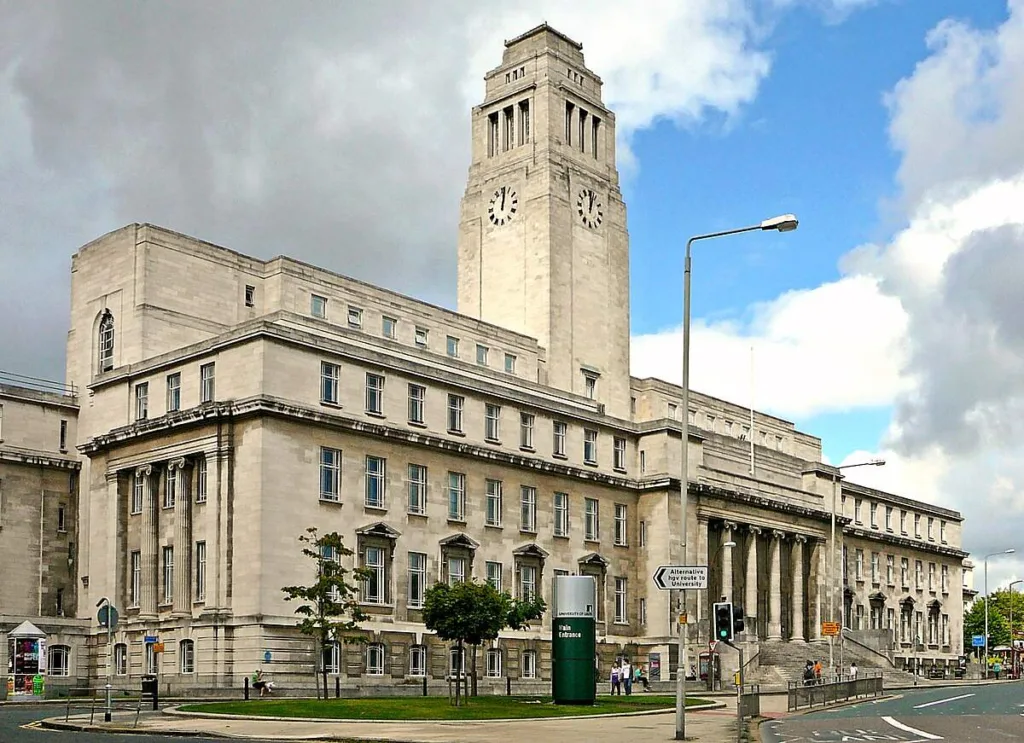
The University of Leeds is a prestigious institution known for its strong Aerospace Engineering program. The university offers an Aerospace Engineering Masters that focuses on aerospace structures and systems engineering, with specialist modules enabling students to succeed in the industry. The program is designed to equip students with the most up-to-date practices and industry-relevant knowledge, and it is accredited by the Institution of Mechanical Engineers and the Royal Aeronautical Society. Students have the opportunity to tailor the degree to suit their specific interests with a broad selection of optional modules, including everything from rotary wing aircraft to aerodynamics and aerospace propulsion. The University of Leeds is also recognized for its globally renowned research, which directly influences the course curriculum, shaping students’ learning with the latest thinking. The university’s strong industry connections and engagement with its Industrial Advisory Board ensure that the program meets the needs of the industry, providing students with a comprehensive and relevant education to prepare them for successful careers in aerospace engineering.
– Overview:
At the University of Leeds, students experience a dynamic learning environment in Aerospace Engineering. The institution’s commitment to providing a broad spectrum of programs prepares graduates for success in an ever-evolving industry. The university offers programs such as Aerospace Engineering and Aerospace Materials.
The key statistics for the University of Leeds’ Aerospace Engineering program are as follows:
- Number of full-time equivalent (FTE) students: 33,450
- Percentage of international students: 32%
- Student-to-staff ratio: 14.4:1
- Average entry tariff: 208
Entry Requirements
To apply for the Aerospace Engineering program at the University of Leeds, you must meet the following entry requirements:
– A-Level: A minimum of 55-85% in maths, physics, and chemistry/A-Level or BTEC Diploma
– English Language Requirements: IELTS: Overall 6.0-7.0, with no band score less than 5.5 to 6.0; TOEFL: 70-100 overall (minimum score 15-22 in each band); PTE: an average of 50-65 with no score lower than 50-60 in all skills
– Application Documents: Up-to-date CV, valid English Language Scores, Statement of Purpose, Letter of Recommendation if asked by the university, and identification documents like a passport
Application Process
1. Research the program: Visit the University of Leeds’ Aerospace Engineering program page to learn more about the course structure, modules, and facilities.
2. Check your eligibility: Ensure you meet the academic and English language requirements for the program.
3. Prepare application documents: Compile your up-to-date CV, valid English Language Scores, Statement of Purpose, Letter of Recommendation (if required), and identification documents like a passport.
4. Submit your application: Apply by the deadline through UCAS, the University and Colleges Admissions Service.
4. University of Glasgow

The University of Glasgow is renowned for its extensive expertise and research in aerospace engineering, with a history of over 60 years in this field. The institution offers a range of undergraduate and postgraduate programs in Aeronautical Engineering and Aerospace Engineering, which are professionally accredited by various engineering institutions such as the Royal Aeronautical Society, the Institution of Engineering and Technology, and the Institution of Mechanical Engineers. Students benefit from access to state-of-the-art facilities, including wind tunnels, flight simulation labs, and unmanned vehicle laboratories, providing them with practical experience and exposure to the latest technologies in the field. The programs are designed to be multi-disciplinary, covering various aspects of aircraft design, aerodynamics, and aerospace engineering, and offer opportunities for industry placements and international study experiences. The University of Glasgow’s strong emphasis on practical training and its long-standing reputation in aerospace research make it an excellent choice for students aspiring to pursue a career in this dynamic and specialized field.
– Overview:
Known for its strong focus on aerospace engineering research and innovation, the University of Glasgow serves as a hub for aspiring engineers. The institution’s dedication to fostering a solid foundation in the field is evident in its programs and faculty expertise. The university offers programs such as Aerospace Systems and Aerospace Design.
Key statistics for the University of Glasgow are as follows:
- Number of students: 28,615
- Undergraduates: 20,420
- Postgraduates: 8,195
- Faculty strength: 2,942
- Student-to-faculty ratio: 14:1
- Percentage of international students: 59:41
- Student satisfaction: 37%
- Median salary of graduates in Aerospace & Aeronautical Engineering: £29,125 (15 months after graduation), £32,050 (3 years after graduation), £37,396 (5 years after graduation)
5. University of Bath
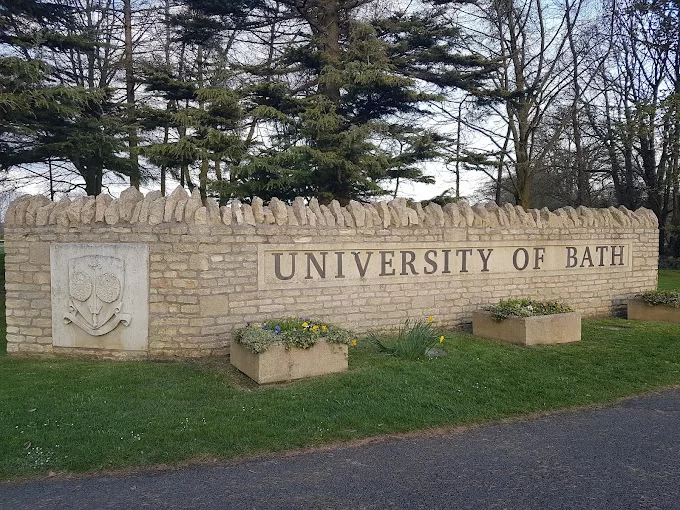
The University of Bath is recognized for its strong Aerospace Engineering program, offering students a comprehensive understanding of aircraft design and manufacture. The program emphasizes practical application, providing students with the opportunity to work with professional engineers from aerospace manufacturers and take a flight test course. The university’s focus on developing transferable skills, such as complex problem-solving and critical thinking, ensures that students are well-prepared for the demands of the industry. The program is designed to equip students with the knowledge and skills required for a successful career in the field, and the university is rated highly for student satisfaction in the Aeronautical and Aerospace Engineering subject area.
– Overview:
The University of Bath is synonymous with excellence in aerospace engineering education. With a comprehensive curriculum, students gain industry-ready knowledge and skills, positioning them for success in the aerospace sector. The university offers programs such as Aerospace Engineering and Aeronautics.
The key statistics and information for the Aerospace Engineering program at the University of Bath are as follows:
- Ranking: The University of Bath is ranked 10th best UK university overall out of 128 universities.
- Course Duration: The Aerospace Engineering program is a 3-year Bachelor’s degree program..
- Student Satisfaction: The University of Bath is rated highly for student satisfaction in the Aeronautical and Aerospace Engineering subject area
Entry Requirements
To apply for the Aerospace Engineering program at the University of Bath, you must meet the following entry requirements:
– A-Level: A minimum of 55-85% in maths, physics, and chemistry/A-Level or BTEC Diploma
– English Language Requirements: IELTS: Overall 6.0-7.0, with no band score less than 5.5 to 6.0; TOEFL: 70-100 overall (minimum score 15-22 in each band); PTE: an average of 50-65 with no score lower than 50-60 in all skills
– Application Documents: Up-to-date CV, valid English Language Scores, Statement of Purpose, Letter of Recommendation if asked by the university, and identification documents like a passport
Application Process
1. Research the program: Visit the University of Bath’s Aerospace Engineering program page to learn more about the course structure, modules, and facilities.
2. Check your eligibility: Ensure you meet the program’s academic and English language requirements.
3. Prepare application documents: Compile your up-to-date CV, valid English Language Scores, Statement of Purpose, Letter of Recommendation (if required), and identification documents like a passport.
4. Submit your application: Apply through UCAS, the University and Colleges Admissions Service, by the deadline.
6. University of Sheffield

The University of Sheffield is a prestigious public research university with a global reputation for excellence. The institution offers a diverse range of undergraduate and postgraduate programs, including Aerospace Engineering. The Aerospace Engineering program at the University of Sheffield is known for its interdisciplinary approach, covering areas such as aerospace materials, aerodynamics, and flight control. The university has strong partnerships with industry leaders, including Airbus UK, BAE Systems, Boeing, EADS, Qinetiq, and Rolls-Royce, providing students with exposure to the latest industry developments and techniques. The program emphasizes employability throughout the studies, ensuring that students gain both breadth and depth of engineering knowledge, as well as the transferable skills demanded by employers. The university is committed to providing a supportive and vibrant atmosphere for its students, contributing to the friendly and diverse environment of the city.
– Overview:
Committed to providing a high-quality aerospace engineering education, the University of Sheffield fosters innovation and research in the field. Students benefit from a rich academic experience and exposure to cutting-edge developments. The university offers programs such as Aerospace Engineering and Aerospace Materials.
The key statistics for the Aerospace Engineering program at the University of Sheffield are as follows:
- Student Satisfaction: The specific student satisfaction score for the Aerospace Engineering program is unavailable in the provided search results.
- Research Quality: The University of Sheffield is known for its strong research quality, with 92% of its research rated as world-leading or internationally excellent.
- Graduate Prospects: The specific graduate prospects score for the Aerospace Engineering program is unavailable in the provided search results.
- Entry Tariff: The entry tariff for the Aerospace Engineering program is 168
Entry Requirements and Application Process
The University of Sheffield offers a range of undergraduate and postgraduate programs in Aerospace Engineering. To apply for graduate admissions, students need a 2:1 undergraduate honors degree (55-60%) or relevant professional experience. The university expects a GMAT score of 600 or above for admission to some of the graduate courses. For undergraduate programs, students need a grade 12 certificate with 70% aggregate or above. The English language proficiency requirements for the university are an overall IELTS score of 7.0 with a minimum of 6.5 in each section or a TOEFL iBT score of 95 with a minimum of 23 in Speaking, 21 in Listening, and 22 in Reading and Writing.
7. Coventry University
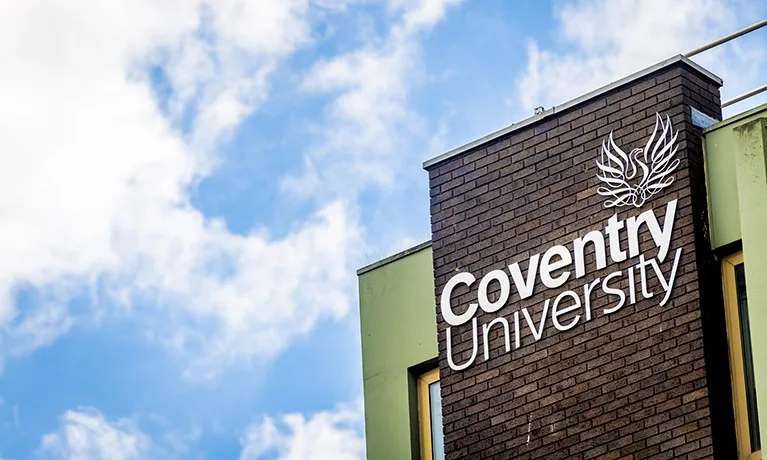
Coventry University is a public research university located in Coventry, England. It was founded in 1843 by entrepreneurs and industrialists. The university is known for its focus on innovative learning and offers a wide range of programs across various disciplines, including Aerospace Systems Engineering. The main campus is based in Coventry, which is a vibrant city and was named the UK City of Culture 2021. The university also has campuses in London and Scarborough, offering flexibility for studying. Coventry University is committed to providing a supportive and vibrant atmosphere for its students, contributing to the friendly and diverse environment of the city. The university has been rated gold overall, silver for Student Outcomes, and gold for Student Experience in the Teaching Excellence Framework. Additionally, the university offers a range of undergraduate and postgraduate degrees with a January start date, providing students with flexible study options.
– Overview:
Coventry University takes pride in offering diverse aerospace engineering programs, emphasizing practical skills and industry-relevant knowledge. Students engage in hands-on learning experiences that prepare them for the challenges of the aerospace industry. The university offers programs such as Aerospace Technology and Aviation Technology.
The key statistics for the Aerospace Engineering program at the University of Sheffield, are as follows:
- Student Satisfaction: The specific student satisfaction score for the Aerospace Engineering programs is unavailable in the provided search results.
- Research Quality: The specific research quality score for the Aerospace Engineering programs is unavailable in the provided search results.
- Graduate Prospects: The graduate prospects for Aeronautical and Aerospace Engineering graduates at Coventry University indicate an average earning of £30,000, 15 months after the course.
Entry requirements:
A level, Access to HE Diploma, GCSE/National 4/National 5, Pearson BTEC Level 3 National Extended Diploma.
For specific and detailed entry requirements, it is recommended to visit the official Coventry University website or contact the university directly.
8. University of Southampton
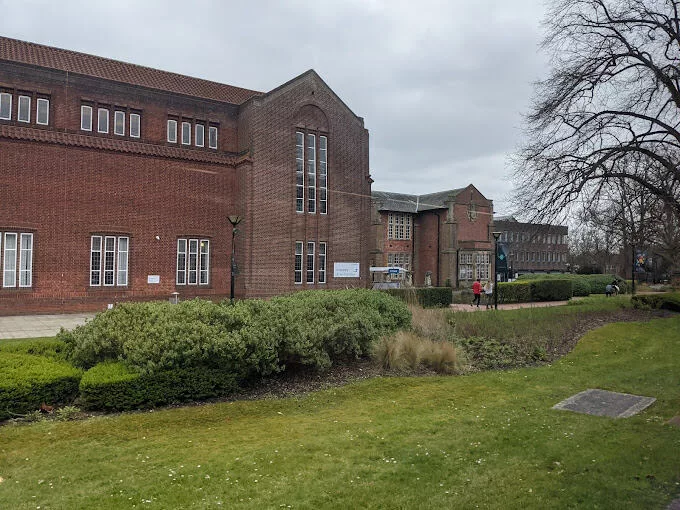
Positioned at the forefront of aerospace education, the University of Southampton stands out prominently in the prestigious 2024 ranking of UK universities. Beyond being merely an educational institution, Southampton catalyzes aerospace excellence. Infused with a dedication to excellence evident in programs like Aerospace Engineering, the university initiates an inspiring journey where theoretical knowledge becomes the driving force propelling graduates into the dynamic landscape of the aerospace industry.
– Overview:
With strong industry connections, the University of Southampton’s research-focused aerospace engineering programs stand out. Students benefit from a supportive academic environment and opportunities to contribute to groundbreaking research initiatives. The university offers programs such as Aerospace Engineering and Astronautics.
The key statistics for the Aerospace Engineering programs at the University of Southampton are as follows:
- Overall Score: 76.2
- Student Satisfaction: 81.5
- Research Quality: 78.9
- Graduate Prospects: 64.8
- Entry Tariff: 152
Entry requirements for Aerospace Engineering BEng, MEng, BSc, MSc (Hons).
A level, Access to HE Diploma, GCSE/National 4/National 5, Pearson BTEC Level 3 National Extended Diploma.
For specific and detailed entry requirements, it is recommended to visit the official University of Southampton website or contact the university directly.
9. University of Brighton
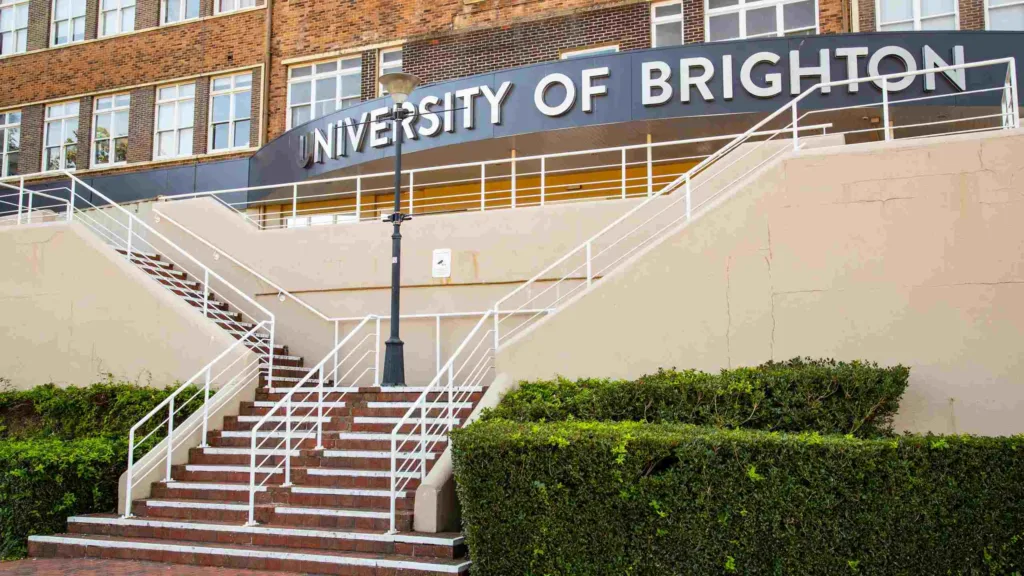
Distinguished for its commitment to nurturing aerospace excellence, the University of Brighton offers a diverse range of aerospace engineering programs. With a strategic blend of theoretical knowledge and hands-on skills, the university prepares students for a triumphant entry into the dynamic aerospace industry. After the provided overview section, you can continue with any additional details or specific information about the entry requirements for aerospace engineering programs at the University of Brighton.
– Overview:
The University of Brighton offers a spectrum of aerospace engineering programs, providing students with the knowledge and skills required for a successful career. Emphasis on practical application ensures graduates are well-prepared for the workforce. The university offers programs such as Aerospace Engineering and Aeronautical Engineering.
The key statistics for the Aerospace Engineering BEng (Hons) program at the University of Brighton:
- Student Satisfaction: 88%
- Research Quality: The specific research quality score for the Aerospace Engineering program is unavailable in the provided search results.
- Graduate Prospects: 70% of graduates are in work or further study six months after graduation.
- Entry Tariff: The typical entry tariff for the Aerospace Engineering program is 112-128 UCAS points.
Entry requirements
1. Must include English language, maths, and physical science. A foundation degree/HND may enable you to start the course in the year
2. English Language Requirements: IELTS: Overall 6.5, with no band score less than 5.5; TOEFL: 80 overall (minimum score 18 in each band); PTE: 54 overall (minimum score 51 in each band)
10. University of Nottingham

Before delving into the overview of the University of Nottingham’s aerospace engineering programs, it’s essential to highlight the institution’s commitment to providing a high-quality education in this field. The university’s focus on academic excellence and industry relevance ensures that graduates are well-prepared for the demands of the aerospace industry. With a strong emphasis on practical skills and theoretical knowledge, the University of Nottingham offers a comprehensive range of programs, including Aerospace Engineering and Aerospace Technology, that equip students with the expertise needed to succeed in the dynamic field of aerospace engineering.
– Overview:
Committed to delivering a high-quality aerospace engineering education, the University of Nottingham prepares students for success in the industry. The institution’s focus on academic excellence and industry relevance ensures graduates are well-equipped for the workforce.
The key statistics for the Aerospace Engineering program at the University of Nottingham:
- Student Satisfaction: The specific student satisfaction score for the Aerospace Engineering program is unavailable in the provided search results.
- Research Quality: The University of Nottingham is known for its strong research quality, with 91.2% of undergraduates from the Department of Mechanical, Materials, and Manufacturing Engineering securing graduate-level employment or further study within 15 months.
- Entry Tariff: The typical entry requirements for the Aerospace Engineering program at the University of Nottingham include A-level A in Maths and either Physics (preferred) or Further Maths as a 2nd subject, or Maths with any two of the following: Chemistry, Biology, Design, Economics, Psychology, Electronics, Computer Science. For applicants predicted AAA including A in maths but not offering the subject combinations above – Biology, Electronics, or Design. Excluding General Studies, Critical Thinking, Citizenship Studies, CIE Global Perspectives and Research, and CIE Thinking Skills
The University of Nottingham’s entry requirements for Aerospace Engineering programs are as follows:
BEng, MEng Aerospace Engineering
1. A-Level: A minimum of AAB, including Mathematics and Physics
2. International Baccalaureate: 34 points, including 6 in Higher Level Mathematics and 6 in Higher Level Physics
3. English Language Requirements: IELTS: Overall 6.0, with no band score less than 5.5; TOEFL: 79 overall (minimum score 17 in each band); PTE: 55 overall (minimum score 51 in each band)
V. Cost of Studying and Available Scholarships
When considering the cost of studying Aeronautical and Aerospace Engineering at various universities, it’s important to review the breakdown of tuition fees for different programs and explore the highlighted scholarships and financial aid options available. Here’s a detailed overview of the cost of studying and the available scholarships at the specified universities:
University of Leeds
- For UK full-time undergraduate students, the tuition fee is set by the UK government and is currently capped at £9,250 for the academic years 2023/24 and 2024/25. However, fees for study abroad or work placement years are substantially reduced, with a reduced fee of £1,385 for home students paying the £9,250 tuition fee1.
- For international students, the tuition fee for the Aerospace Engineering MSc program is £31,000 in total.
- The University of Leeds offers a range of scholarships and financial aid options to support students from all backgrounds, including scholarships for international students.
University of Bristol
- The tuition fees for the Aerospace Engineering program at the University of Bristol vary. For international students, the tuition fee for the Aerospace Engineering MEng program is £25,900 per year5.
- The University of Bristol provides various scholarships and financial aid options for both home and international students, including the Think Big Undergraduate Scholarships for international students.
University of Glasgow
- The tuition fees for the Aerospace Engineering program at the University of Glasgow differ based on the student’s domicile. For international students, the tuition fee for the Aerospace Engineering BEng program is £25,000 per year.
- The University of Glasgow offers a range of scholarships and financial support, including the University of Glasgow International Leadership Scholarship for international students.
University of Bath
- The tuition fees for the Aerospace Engineering program at the University of Bath vary. For international students, the tuition fee for the Aerospace Engineering MEng program is £25,000 per year.
- The University of Bath provides various scholarships and bursaries, including the Global Leaders Scholarship for international students.
University of Sheffield
- The tuition fees for the Aerospace Engineering program at the University of Sheffield differ. For international students, the tuition fee for the Aerospace Engineering MSc program is £25,750 in total.
- The University of Sheffield offers a range of scholarships and funding opportunities, including the International Merit Postgraduate Scholarship for international students.
Coventry University
- The tuition fees for the Aerospace Engineering program at Coventry University vary. For international students, the tuition fee for the Aerospace Engineering BEng program is £18,600 per year.
- Coventry University provides several scholarships and discounts, including the Academic Excellence Scholarship for international students.
University of Southampton
- The tuition fees for the Aerospace Engineering program at the University of Southampton differ. For international students, the tuition fee for the Aerospace Engineering MEng program is £22,950 per year.
- The University of Southampton offers a variety of scholarships and bursaries, including the Southampton Merit Scholarship for international students.
University of Brighton
- The tuition fees for the Aerospace Engineering program at the University of Brighton vary. For international students, the tuition fee for the Aerospace Engineering BEng program is £14,376 per year.
- The University of Brighton provides a range of scholarships and bursaries, including the International Huxley Scholarships for international students.
University of Nottingham
- The tuition fees for the Aerospace Engineering program at the University of Nottingham differ. For international students, the tuition fee for the Aerospace Engineering MEng program is £25,000 per year.
- The University of Nottingham offers various scholarships and funding opportunities, including the Developing Solutions Masters Scholarship for international students.
VI. Job Prospects and Career Opportunities
Aerospace engineering presents a dynamic and diverse landscape of career opportunities for individuals passionate about innovation and aeronautics. Navigating this field requires a thorough exploration of potential career paths and an understanding of the average salaries and career advancement prospects.
Exploration of Potential Career Paths
- Aircraft Design Engineer: Contribute to the design and development of cutting-edge aircraft.
- Aerospace Systems Analyst: Analyze complex systems to enhance efficiency, safety, and performance in aircraft and spacecraft.
- Flight Test Engineer: Assess and validate the performance of aerospace systems through rigorous flight testing.
- Space Mission Planner: Contribute to the planning and execution of space missions, pushing the boundaries of exploration beyond our atmosphere.
Average Salaries and Career Advancement Prospects
Aerospace engineers are in high demand, reflected in competitive salaries. On average, entry-level positions offer a solid foundation, with the potential for significant increases as experience and expertise grow. According to industry reports, the average annual salary for aerospace engineers ranges from $80,000 to $120,000, depending on factors such as experience, specialization, and geographical location.
Navigating the Aerospace Job Market
Crafting compelling job proposals that showcase skills and enthusiasm can be a key differentiator in the aerospace job market. Tailoring proposals to highlight relevant experiences, skills, and a genuine passion for the aerospace industry is essential. Additionally, leveraging expertise in areas such as website design and WordPress to create a professional portfolio can enhance job prospects.
VII. Testimonials and Student Reviews: Navigating Aerospace Engineering Education in the UK
Testimonial 1:
Name: Sarah Williams, Aerospace Engineer at Airbus
Quote: “Choosing to pursue aerospace engineering at the University of Cambridge was a life-changing decision. The top-notch education combined with hands-on projects alongside industry experts set the stage for my successful career in the aerospace industry. Today, as part of the Airbus team, I contribute to pushing the boundaries of aviation technology. My time at Cambridge laid a strong foundation and provided the inspiration that guides me in my career.“
Testimonial 2:
Name: David Smith, Spacecraft Engineer at NASA
Quote: “My passion for space exploration led me to pursue a Master’s in aerospace engineering at Imperial College London. The program’s emphasis on cutting-edge research and collaboration with the European Space Agency equipped me with knowledge and hands-on experience. After graduating, I joined NASA’s Jet Propulsion Laboratory, contributing to the development of spacecraft for interplanetary missions. Imperial College gave me the skills and confidence to thrive in this exciting and challenging field.“
Testimonial 3:
Name: Emily Jones, Avionics Engineer at Boeing
Quote: “Opting for the University of Bristol for my aerospace engineering degree was one of my best decisions. The focus on practical learning and strong industry connections allowed me to gain valuable experience and build relationships with potential employers. Today, as an avionics engineer at Boeing, I design and test flight control systems. The hands-on skills and industry insights I gained at Bristol have been instrumental in my career growth.“
Testimonial 4:
Name: Michael Brown, Defense Systems Engineer at BAE Systems
Quote: “My time studying aerospace engineering at the University of Glasgow was incredibly rewarding. The program’s focus on systems engineering and collaboration with leading defense companies provided me with a comprehensive understanding of the industry’s needs. Joining BAE Systems as a defense systems engineer, I contribute to the development of advanced military aircraft. The rigorous education and industry exposure at Glasgow have been invaluable in my role.”
Testimonial 5:
Name: Jessica Green, Aerospace Research Engineer at Rolls-Royce
Quote: “Opting for a Ph.D. in aerospace engineering at the University of Bath was driven by my fascination with propulsion systems. The university’s world-renowned research facilities and faculty expertise provided the perfect environment for exploring my interests. Today, as a research engineer at Rolls-Royce, I contribute to developing innovative engine technologies for future aircraft. The research skills and knowledge I gained at Bath have been essential in my contribution to this exciting field.”
Conclusion and Encouragement: Navigating Your Aerospace Engineering Path
As we conclude our exploration of top Aerospace Engineering programs in leading UK universities, let’s recap the standout institutions and distill crucial insights. Furthermore, I offer encouragement for you to forge ahead on this journey, armed with newfound knowledge.
Universities and Their Distinct Strengths:
- Imperial College London: Acknowledged for its world-class research and industry affiliations, Imperial College offers unparalleled opportunities for students to glean insights from leading experts and engage in cutting-edge projects.
- University of Bristol: Renowned for fostering innovation and entrepreneurship, Bristol challenges students to think creatively and devise solutions to real-world challenges.
- University of Leeds: Embracing diversity, Leeds provides a global community where students receive a well-rounded education, preparing them for the international aerospace landscape.
- University of Glasgow: Excelling in bridging theory and practice, Glasgow’s strong industry ties afford students real-world applications of their knowledge.
- University of Bath: Offering a supportive and collaborative atmosphere, Bath nurtures students through hands-on projects and close interactions with faculty.
- Coventry University: Prioritizing industry-relevant education, Coventry readies students for success in the competitive aerospace job market, emphasizing practical skills and applied knowledge.
- University of Southampton: Setting high standards and encouraging innovation, Southampton inspires students to contribute to the aerospace industry’s advancement.
- University of Brighton: Providing a nurturing and inclusive environment, Brighton ensures personalized attention for students, equipping them with the skills and knowledge needed for a prosperous aerospace career.
- University of Nottingham: Going beyond technical education, Nottingham cultivates leaders in the aerospace sector with a strong focus on research and entrepreneurship, preparing graduates for pioneering roles in the industry.
- University of Nottingham: The institution focuses on cultivating both technical expertise and leadership qualities, ensuring graduates are well-prepared for pioneering roles in the aerospace industry through a commitment to research and entrepreneurship.
Key Takeaways
- Diverse Experiences: Each university offers a unique journey, catering to different learning styles and aspirations.
- Practical Learning: Emphasis on hands-on projects and industry connections ensures graduates are well-prepared for the challenges of the aerospace sector.
- Innovation and Leadership: The focus extends beyond traditional education, encouraging innovation and nurturing leadership qualities crucial for success in the aerospace industry.
Encouragement to Explore Further
As you continue your exploration of aerospace engineering education, delve into the specific offerings, faculty expertise, and industry connections of each university. Attend virtual open days, connect with current students, and seek additional resources to make informed decisions.
Make Informed Decisions
Your academic journey is a significant investment in your future. Consider your unique goals, learning preferences, and career aspirations. Consult with academic advisors, explore university resources, and trust the insights gained from testimonials and student reviews.
VIII. Call to Action: Ignite Your Aerospace Journey
As we conclude this exploration of Aerospace Engineering programs, the next step is yours to take. Seize the opportunity to shape your academic future by exploring specific universities or initiating applications.
Explore Your Options
Delve deeper into the offerings of the universities that resonated with you. Visit their websites, attend virtual open days, and immerse yourself in the unique aspects of each Aerospace Engineering program.
Ignite Your Passion
Embark on this academic journey with a flame of passion. Consider the practical applications, industry connections, and innovative approaches the universities offer. Let your enthusiasm guide your exploration.
Apply for Aerospace Engineering UK
The first step towards a thriving aerospace career is initiating your application. Whether you’ve found your ideal fit or are still exploring, taking action now positions you for success. Apply for Aerospace Engineering UK and unlock a world of possibilities.
Your journey in Aerospace Engineering awaits, and the universities are eager to welcome the next generation of innovators. Take the leap, apply, and embark on a transformative educational experience that will shape your career in the aerospace industry. Best of luck on your exciting venture!
Safe travels on your academic odyssey!
IX. Frequently Asked Questions (FAQs) – Navigating Aerospace Engineering in the UK
In your pursuit of knowledge about Aerospace Engineering programs in the UK, here are answers to some commonly asked questions:
What are the typical entry requirements for Aerospace Engineering programs in the UK?
The entry requirements vary between universities, but they generally include academic qualifications in mathematics and physics at the secondary education level. Additionally, some institutions may require specific A-levels or equivalent qualifications.
Are there specific scholarships available for international students pursuing Aerospace Engineering?
Certainly, numerous universities provide scholarships tailored for international students interested in Aerospace Engineering. Explore the financial aid and scholarship options presented by each university to discover opportunities aligning with your academic aspirations. Here are examples of scholarships accessible to international students:
- The University of Cambridge International Scholarships
- The Imperial College London President’s Scholarships
- The University of Oxford Clarendon Scholarships
- The University of Bristol Global Scholarships
- The University of Glasgow International Leadership Scholarships
What potential job roles can I anticipate after completing a degree in Aerospace Engineering?
Upon completing a degree in Aerospace Engineering, graduates have a spectrum of career options, including:
- Aerospace Engineer
- Aircraft Designer
- Avionics Engineer
- Propulsion Engineer
- Flight Test Engineer
- Spacecraft Engineer
- Systems Engineer
- Research and Development Engineer
- Technical Sales Engineer
- Project Manager
The aerospace industry offers diverse career paths, enabling graduates to engage with cutting-edge technologies and contribute to advancements in aviation, space exploration, and defense.
How can I apply for Aerospace Engineering programs in the UK as an international student?
To apply for Aerospace Engineering programs in the UK as an international student, follow these comprehensive steps:
- Research and Choose Universities: Explore UK universities offering Aerospace Engineering programs, selecting those aligning with your academic interests and career goals.
- Check Entry Requirements: Verify that you meet entry requirements, encompassing academic qualifications, English language proficiency, and any specified university-specific requirements.
- Prepare Application Materials: Assemble necessary materials like transcripts, a personal statement, letters of recommendation, and other documents specified by the university.
- Submit Application: Utilize the university’s online application portal or UCAS (Universities and Colleges Admissions Service, if applicable) to submit your application.
- Participate in Interviews (if required): Some universities may necessitate interviews as part of the application process for international applicants.
- Apply for Scholarships (if applicable): If eligible, apply for scholarships and financial aid from the university or external organizations.
- Receive an Offer and Apply for Student Visa: Upon a successful application, expect to receive an offer letter. Subsequently, apply for a student visa to study in the UK.
The application process typically involves submitting an online application through the university’s admissions portal. You’ll need to provide academic transcripts, a personal statement, letters of recommendation, and proof of English language proficiency (if applicable). Check each university’s website for specific requirements.
What is the typical duration of internships offered during these programs?
The duration of internships within Aerospace Engineering programs can vary, with many incorporating industrial placements or internships to provide students with hands-on experience. The duration typically spans from a few weeks to several months, delivering valuable insights into the dynamic aerospace industry.
Illustrative Internship Duration:
– University of Cambridge: 4-12 weeks
– Imperial College London: 8-12 weeks
– University of Oxford: 6-12 weeks
– University of Bristol: 8-12 weeks
– University of Glasgow: 6-12 weeks
– University of Bath: 8 to 12 weeks.
– University of Sheffield: 6 and 12 weeks.
– Coventry University: 4 to 12 weeks.
– University of Southampton: 8 and 12 weeks.
-University of Nottingham: 6 to 12 weeks.
Some programs may integrate shorter internships as part of coursework requirements, while others may offer more extended opportunities during the summer or as part of a cooperative education (co-op) program. The specific duration of internships can also vary based on the hosting company or organization.
Internships constitute a vital component of many Aerospace Engineering programs, enabling students to apply theoretical knowledge in practical settings, acquire hands-on experience, and establish valuable connections within the industry.

